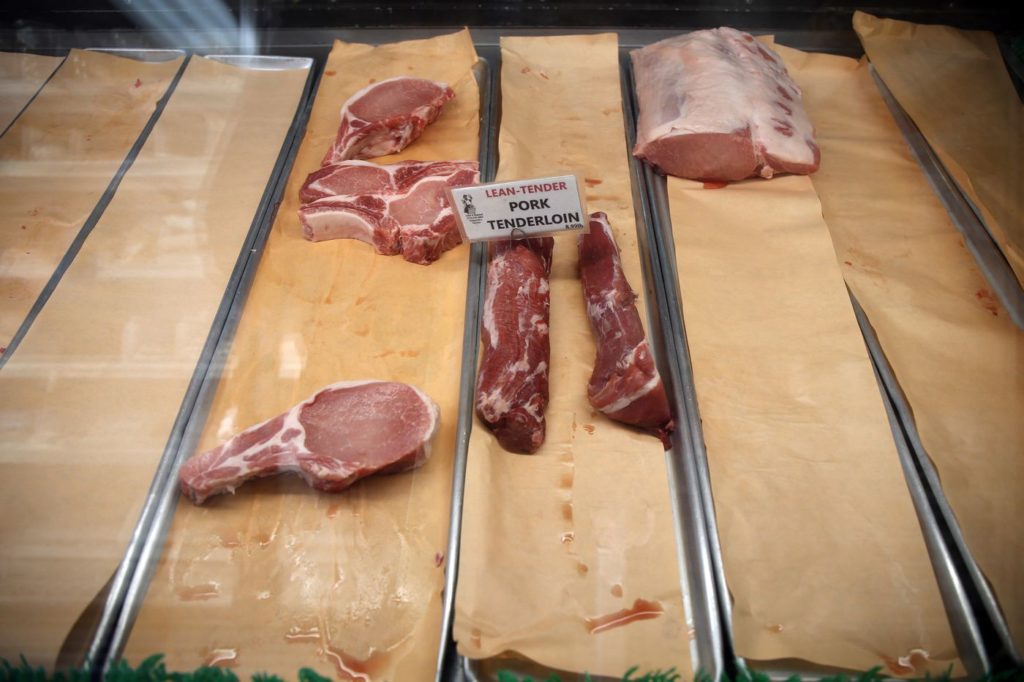
Image Source: Chicago Tribune
Every week we track the business, tech and investment trends in CPG, retail, restaurants, agriculture, cooking and health, so you don’t have to. Here are some of this week’s top headlines.
As dozens of meatpacking plants across the country have shut down because of coronavirus outbreaks, disruptions in the supply chain are reaching customers at fast food chains and grocery stores. On Monday, one-fifth of Wendy’s restaurants in the US were sold out of beef products. Retailers like Kroger, Costco and Giant Eagle and more have placed a product cap on purchases of beef, pork and poultry.
In turn, the meat shortages are boosting sales of meat alternatives. Impossible Foods will now be sold in Kroger stores nationwide, and Beyond Meat saw its shares jump 49% last month.
Last but not least, Howard Schultz is calling for a Marshall Plan for small businesses, especially the 500,000 independent restaurants that are the most vulnerable businesses in this new era of social distancing.
The COVID-19 pandemic has put more than 10 million independent restaurant workers at risk of losing their jobs for good. Across sectors, businesses are being forced to pivot their business models as consumers go on lockdown and change their buying habits. This round-up features many of the ways the pandemic is impacting all parts of the food industry.
In an effort to do our part and support the community we love so dearly, we have compiled a list of resources and organizations that are providing support to those in need. We are also offering free job postings to anyone who is looking to employ people impacted by the COVID-19 pandemic.
- Resources: We have compiled a database of resources for those in the food industry impacted by the pandemic here. Please add your own resources as well.
- Jobs: We need to band together to support everyone across the food system who has lost their job due to the pandemic. Use code “coronavirusfoodjobs” to post remote or remote-friendly food jobs on our job board for free.
We need your support as well. Producing our newsletter takes a lot of time and resources, and we need to change our business model to keep it going. To date, we’ve funded our work through our events, sponsorships and consulting, which are all on hold due to the pandemic. If you find our newsletter to be a valuable resource, we hope you will consider making a one time or monthly contribution, so we can keep the newsletter going and free for those who can not afford a subscription fee. Whether it’s $5 or $500 every bit helps and shows us that you value our work. Not able to contribute right now? You can help by sharing our newsletter with friends and colleagues.
Check out our weekly round-up of last week’s top food startup, tech and innovation news below or peruse the full newsletter here.
1. A Wendy’s With No Burgers as Meat Production Is Hit – New York Times
On Monday, nearly one-fifth of Wendy’s restaurants–over 1k locations–were sold out of beef products. Last week was the fourth week in a row that the number of cattle slaughtered fell below 500k, down more than 35% from average beef production.
2. Grocery Stores Limiting Meat Purchases Over Concerns of a Shortage – CBS
Albertsons has limited meat items to two per customer at its Pavilions, Vons, Safeways and Albertsons stores. Kroger also announced that it was limiting the sale of ground beef and pork at its Ralphs and Food 4 Less stores.
3. Tyson Says Nation’s Pork Production Is Down 50%, Despite Trump’s Order to Keep Meat Plants Open – The Washington Post
Last Friday, pork production was down 42.9% for all US companies. Tyson was short 74% for hogs processed per day. According to the CDC, 130k workers at 115 processing facilities had 4.9k cases and 20 deaths.
4. With Meat Shortages Looming, Kroger Rolls Out Impossible Burgers – Bloomberg
The plant-based burger will be sold in more than 1.7k Kroger stores in 28 states as well as the company’s website.
5. America’s Small Businesses Need a Marshall Plan – Howard Schultz
Schultz launched The Plate Fund to provide $500 grants to the hardest hit food service workers in the Seattle area. It’s now on course to distribute $7m to 14k eligible workers. But providing money alone is not sufficient.
6. USDA to Purchase $470M in Surplus Meat, Dairy and Produce – Food Dive
The department said this will allow more products to be distributed to communities nationwide, while giving financial support to struggling producers. The buys will include fruits, vegetables, meat, dairy and seafood.
7. One Meat Plant. One Thousand Infections. [Podcast] – New York Times
One of the largest coronavirus outbreaks in the US has been inside the Smithfield pork factory in Sioux Falls. A worker at the plant, a refugee who survived civil war and malaria, finds her life and livelihood threatened anew.
8. Those We’ve Lost – Eater
In NYC, where COVID-19 has hit harder than anywhere else in the country, the number of people dying in the restaurant industry is growing. Here’s who they were—and the impact they made.
9. Natural Products Expo East Set to Debut This Year in Philadelphia – New Hope Network
Natural Products Expo East will go on with considerations for today’s coronavirus challenges. Here’s a letter from show organizer New Hope Network.
10. ‘We Had to Do Something’: Trying to Prevent Massive Food Waste – New York Times
Over the next few weeks, the USDA will begin spending $300m a month to buy surplus produce, dairy and meat from distributors and ship them to food banks and charitable groups. New York will give food banks $25m to buy products made from excess milk.
11. Instacart’s Frantic Dash From Grocery App to Essential Service – Bloomberg
The grocery delivery startup added 300k workers in eight weeks, but Covid-19 is still overtaking it in more ways than one.
12. One of the World’s Best Restaurants Might Not Reopen for Business – Bloomberg
The future of Eleven Madison Park is uncertain. It will take millions of dollars to reopen.
13. Fake Meat Startups Rake in Cash Amid Food Supply Worries – Bloomberg
Beyond Meat saw its shares jump 49% last month. Meanwhile, venture capitalists have been pouring money into smaller cultured and plant-based meat companies. In mid-April, US sales of these products were double that of the same period last year.
14. Cargill Expands Plant-Based Protein Food for China – Reuters
It plans to offer more plant-based products to the food service sector and also introduce a consumer brand called PlantEver at the end of June with both online and offline retailers.
15. As Coronavirus Pandemic Pushes More Grocery Shoppers Online, Stores Struggle to Keep Up with Demand – CNBC
Only about 3% or 4% of grocery spending in the US was online before the pandemic, but that’s surged to 10% to 15%. If the online shopping habit sticks, it could represent a meaningful shift in an industry that’s been slow to go digital.
16. A Former Farmworker on American Hypocrisy – New York Times
In the pandemic, “illegal” workers are now deemed “essential” by the federal government.
Our newsletter is the absolute easiest way to stay on top of the emerging sector, so sign up for it today and never miss the latest food tech and innovation news and trends, Already signed up? Share the love with your friends and colleagues!





